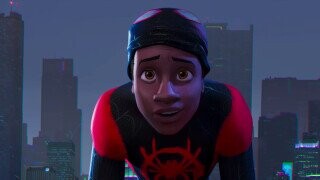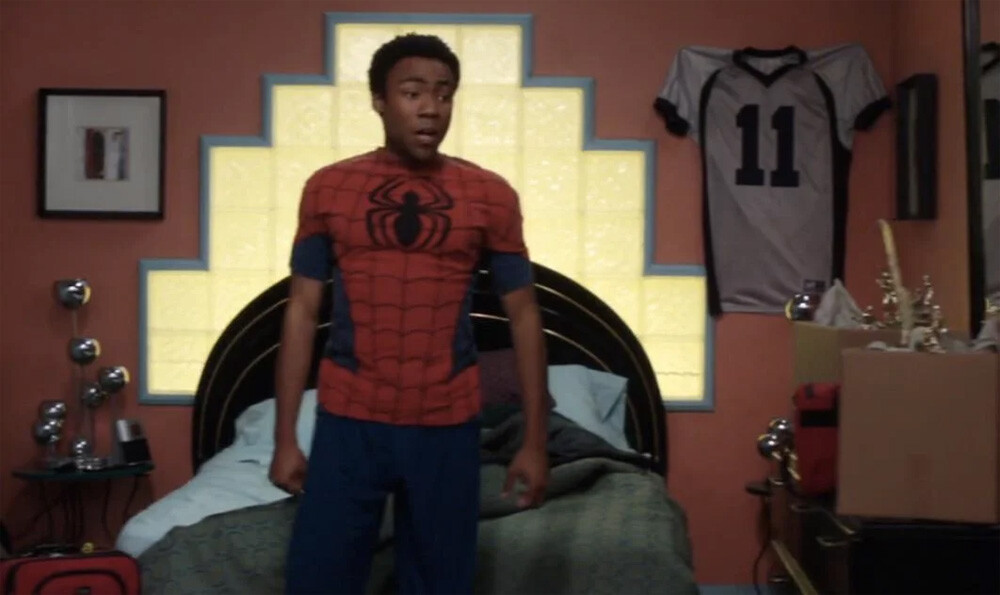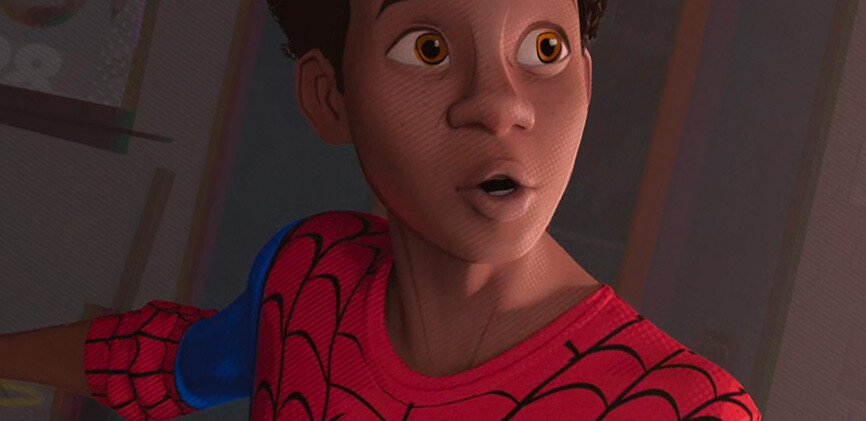Miles Morales Succeeded Where Other Spider-Man Successors Failed

After a long wait, Spider-Man: No Way Home is finally swinging into theaters. To celebrate, Cracked is doing a deep dive into the pop-culture web that our friendly neighborhood wall-crawler has spun for almost six decades. Check the previous installments here:
The Most Amazing Thing About Spider-Man (Is That He Even Exists)
How Sam Raimi's 'Spider-Man' Changed Everything
Don't Miss
Spidey's Bonkers '60s Cartoon All The Spider-Man Memes Came From
How 'Spider-Man: The Animated Series' Got It All Right
We're also giving away a year-long subscription to Marvel Unlimited. Learn more here, or add your email below to enter.
In 2000, Marvel launched its Ultimate imprint where they gave their most popular heroes the American Airlines treatment by losing their baggage so that new fans could get into these comics without having to do any homework. These same fans quickly discovered, though, that reading through a few Wikipedia summaries was a small price to pay for not having to watch the brother and sister duo of Quicksilver and Scarlet Witch go all Lannister on each other.
Besides incest, other standouts from the Ultimate universe included changing Dr. Doom's name to Victor Van Damm (yet never showing him do any sick-ass splits because Marvel is a house of COWARDS) and having The Blob quite literally eat Wasp. Most of these moments were thankfully discarded and forgotten when the Ultimate line finally ended in 2015. But one of them lived.
Miles Morales' Moment
Miles Gonzalo Morales, the Afro-Latino Spider-Man of Earth-1610, survived the destruction of the Ultimate universe and made the jump to the official Marvel continuity. Since then, was in the Oscar-winning animated film Spider-Man: Into the Spider-Verse …
… was the star of his own PlayStation game, and appears to be in the MCU plans once Tom Holland decides that he is ready to pass on the mantle.
You have to wonder, though, why Miles was the one who made it. There were many other Spider-Man spin-off characters before him, yet none gained as much popularity as him despite being way easier to market in Europe where Miles Morales had to be renamed to just "Kilometers" because they don't use miles or morals over there. So how did Miles get to where he is today?
The Character's Crazy Creation
Created in 2011 by writer Brian Michael Bendis and artist Sara Pichelli, with contributions from Marvel's then-Editor-In-Chief Axel Alonso, current Marvel Executive Vice President and Creative Director Joe Quesada, and Mark Millar, Miles also wouldn't be here without Barack Obama, Donald Glover, and … Glenn Beck? What kind of Mad Libs orgy was that, and why weren't we invited? Okay, let's back up a little.
According to Quesada, Marvel wanted to do "a Spider-Man of ethnic origins" for decades, but the timing never felt right. That all changed when Barack Obama became president, and suddenly plans were in motion to introduce the first Black Spider-Man to the world. Marvel just needed the right story first. Enter Mark Millar, who one day approached Quesada with a genius, totally original idea for a storyline titled "The Death of Spider-Man," which he received in his sleep when the Magic Unicorn God horned inspiration directly into his brain one dark and stormy night. It was then decided that the Ultimate version of Peter Parker would be killed off, and a brand-new Black character would become the new Spider-Man.
The job of designing that character fell to Brian Bendis, who instead of ethereal unicorn horning turned to TV as a muse, basing Marvel's Ultimate Spider-Man on Donald Glover wearing Spider-Man pajamas in the season 2 episode "Anthropology 101" of Community.

NBC
Aaaand then, conspiracy theorist, political commentator, and the dead ringer for Santa Claus if he only delivered copies of Atlas Shrugged (at market price), aka Glenn Beck, discovered Marvel's new creation. In his own words: "Do I care if he's half-Hispanic, all-Hispanic? No. Half-black, half — I don't care, I really don't care … I don't really care. I don't care. I don't care, it's a stupid comic book," he said caringly, while caring, like actual non-caring people don't. To be fair to him, Beck didn't actually have anything bad to say about Miles. But he wanted his audience to really think about what it meant that there was a non-white Spider-Man out there … and then hopefully tell him cause he couldn't critically analyze a Garfield strip (the lasagna represents his lust, Glenn! It's so obvious!)
According to Bendis, Beck was the first celebrity to put Miles on the map. Soon the character was discussed by Stephen Colbert and Howard Stern, and Miles was on his way up.
It's Like All The Previous Spider Spin-Offs Were Leading To Miles Morales
Sorry, not all of these entry titles will be alliterated. But, yeah, in a way, Miles feels like a mix of the non-Parker Spider-Men who came before him. For example, while he's the first Black Spidey, he wasn't the first Latino to take on that identity. That title belongs to Miguel O'Hara, an Irish-Mexican-American geneticist created by Peter David and Rick Leonardi in 1992 for the Marvel 2099 line that took place in a dystopian futuristic world where mega-corporations exploit the poor by controlling the laws and law enforcement. Look, people with spider-powers are one thing, but if comics want to be taken seriously, they need to dial down the crazy flights of imagination.
Anyway, after getting a spot in the Alchemax School for Gifted Youngsters, Miguel gets a job as a geneticist at the 2099 version of Amazon-X, and when he eventually tries to quit, his boss roofies him, making Miguel addicted to future cyber-meth called "Rapture." Since the drug bonds with the user's DNA, Miguel uses the Technobabbletron 6900 to purge his system of the drug, but then his disgruntled subordinate sabotages the process, rewriting Miguel's DNA to be 50% spider. Personally, I'd have gone with putting taste buds in my enemy's butthole, but(t) that's just me, I guess.

Marvel
However, instead of a sequel to The Fly, Miguel emerges from the machine stronger, faster, and with fangs that he could use to bite people and paralyze them with venom, all of which he decided to use against mega corporations oppressing people. Bizarrely, many parts of this sci-fi vampire-ish Spider-Man seem to have become a basic blueprint for the creation of Miles Morales.
Miles' adventure chronologically begins with him winning the prestigious Brooklyn Visions Academy scholarship before a genetically-altered spider bite gives him increased strength, speed, and the "venom strike." Now, that last one actually uses Miles' bio-electricity instead of actual venom to paralyze his foes. Still, when you factor in that his 2020 game focused on Miles' struggle against a mega-corporation terrorizing disenfranchised people, you can sort of see how Spider-Man 2099 had a talon-hand (cause, yeah, he also has talons) in the character's creation.
Then you have Ben Reilly. Created a few years after Miguel (actually, the chronology on this is a bit screwy but let's not get into it), Ben is Peter Parker's clone grown by the supervillain Jackal, aka Miles Warren. Here's where things get interesting: See, if you replace the first letter in Warren's first name with an upside-down W (for "What a twist!"), it kind of looks like "Miles," the same name that Bendis gave his Black Spider-Man! Woah! You can definitely see bits of Ben (who also went by Scarlet Spider) in Miles Morales, like how they are both a bit more idealistic, sometimes MAYBE to the point of naivety, than Peter Parker. Along with both loving hoodies.

Marvel
Speaking of costumes, Miles got a new one earlier this year while celebrating his 10th anniversary. A costume that bears a lot of similarities (with the colors switched around) to the one worn by Kaine Parker, another Peter clone, from the time that he was the Scarlet Spider. Thankfully, they didn't take inspiration from the Kaine costume that looks like smoking paint scraped off a monster must feel like.

Marvel
Miles also seems to take some inspiration from May Parker, the teenage daughter of Peter and Mary Jane Watson. First appearing in a 1997 What If? issue, the character mostly went by Spider-Girl and for a time held the record for the longest-running Marvel book with a female lead. There are a lot of great things about this Spider-Girl, but what made her character stand out is the relationship she had with her parents, who eventually started to support her crimefighting. Miles Morales, on the other hand, took that idea of a strong parental connection and took it to new heights.
Miles Is So Interesting Because Of His Family Ties
When Spider-Man was first created, he was one of the first teenage superheroes in an era where anyone under 18 in comics was relegated to the role of bystander or sidekick whose main job was to fetch the adult superhero his Asbestos-flavored cigarettes. Peter Parker's young age and the problems that came with it were something that young readers could identify with. Buuuuuut, if we're being honest, maybe PePa wasn't exactly a perfect example of the typical teen experience, what with him being raised by his elderly (though getting younger and hotter in the movies) aunt and having to live through the murder of his uncle. If most American kids actually struggled with things like that, then all those sore losers wouldn't constantly groan at me when I win online Scrabble with "avunculicide."
In that regard, Miles is a little more relatable. He is still a geek and a nerd like Peter, but his parents are still alive, and Miles' relationship with them is one of the best things about the character. For example, his father, Jefferson Davis, is a loving man who came from an abusive home, which is why he wanted Miles to use his mother's surname -- giving his son a fresh start in life. (Other comics explained Miles surnames as following Hispanic naming customs.) However, when he was younger, Jefferson was a career criminal, and when Miles learns of this, it makes him wonder if crime and evil are wired into his DNA.

Marvel
That's some heavy stuff to weigh down on a kid's heart, but it only got heavier from then on. On Earth-1610, Miles' mother, Rio, was shot after her son was attacked by Ultimate Venom, and as she died, Miles revealed his secret to her. Rio said she was proud of him but begged him not to tell his father. How right she was because when Jefferson found out about his son's spandex hobby, he did not take it well, abandoning his child and blaming him for the deaths of Rio and his brother. Let's talk more about the latter.
Turns out that Miles and Peter Parker aren't that different since the former also has an uncle. An evil uncle. The anti-Uncle Ben, basically. Uncle … Neb. For … uh … "morally NEBulous!" Actually, his uncle is Aaron Davis, aka Prowler, and like Ben, he also played a big part in his nephew's origin, as he was the one who (accidentally) stole the genetically-modified spider that gave Miles his powers and who later tricked him into helping him in his criminal career. He was then killed because of it. This is very Peter Parker-esque but taken to another level. Imagine the emotions that a kid goes through when he realizes that a family member whom he loved and admired tricked him into committing crimes and then died due to them.
With Uncle Ben, it was straightforward; It's a lot more complicated with Miles and Aaron. There are a lot of complex emotions at work here that some Miles Morales comics, as well as Into the Spider-Verse, really got into. This all was erased when Miles jumped into Marvel's main 616 continuity, and now both of his parents and uncle are alive. Hopefully, they will keep that when Miles makes his live-action debut because his family is one of the most important parts of the character. But not the most important part …
Miles Morales Finally Gives A Satisfying Answer To The Question "Who Can Be Spider-Man?"
Ben Reilly, Kaine Parker, May Parker … all the previous attempts at a Spider-Man spin-off weren't really that much of a spin-off as they shared Peter Parker's DNA. 100% of it in the first two cases. "Who can be Spider-Man?" Well, according to comics, you apparently have to be a clone of the original or be shot out of PP's pee-pee.
Yeah, Miguel O'Hara is an exception, but that character was so removed from the basic idea of Spider-Man, both chronologically and in terms of looks/powers, that he doesn't really help answer the question. Spider-Man 2099 seems to say you can be unrelated to Peter Parker and be Spider-Man ... if you just completely change the definition of "Spider-Man." It's like saying that you eat salad every day because you count pizza as a tomato and cheese salad on a giant crouton.

Sony Pictures
Miles, however, shows us that Spider-Man does not belong to the Parker bloodline. He wasn't the first one to do it, but he is undoubtedly the most famous character who got that message out. In the right circumstances, anyone can put on the webbed mask and live up to its ideals. Alright, yeah, the circumstances are insane, and being a genius is kind of required here but what's important is that Miles has helped more kids picture themselves as Spider-Man. Not just Black and Latino kids but all kids because while Miles' ethnicity is a core and important part of his character, it would be a despicably dickish disservice to pigeonhole him as the "Black Spider-Man." You don't need to prefix it. Miles Morales is simply Spider-Man, full stop.
More importantly, despite sharing some similarities with Peter Parker, he is also his own man and does things his own way and has his own problems that weren't or, in many cases, couldn't be explored with the original character. His very existence and growing popularity expand the idea of "Spider-Man" in the most authentic way possible. "Who can be Spider-Man?" To a newer generation of kids around the world, the answer to that question is "Maybe … me?" And a lot of that is thanks to Miles.
Follow Cezary on Twitter.
Top image: Sony Pictures
For more Cracked deep dives, be sure to check out:
‘90S WEEK:
In The 1990s, The Simpsons Were A Danger To America
The '90s Officially Turned Gaming Into A Pop-Culture Fixture
How '90s Superhero Cartoons Prepared Us For The 'Cinematic Universe' Era Facebook Twitter Pinterest
The '90s 'Star Wars' Special Editions Kicked Off The Never-Finished Movie Era
3 Ways 90s Internet Changed Everything
MCU WEEK:
The 'Avengers' Comic That Basically Created The Modern Superhero Movie
Why Marvel Studios Is Branching Out Beyond Superheroes-- Sort Of
Marvel's Long And Confusing Path To Figuring Out Television
How Marvel Handles 'Black Panther' Is A Heartbreaking Task
All of the New Marvel Characters Getting Set Up In Phase 4
The Long, Stupid Road To A Watchable ‘Fantastic 4’ Movie
SUPERMAN WEEK:
4 Reasons Anyone Who Says 'Superman Is A Boring Superhero' Is Full Of It
4 Reasons O.G. Superman Is Even More Relevant Today
5 Superman Stories That Are Canon Kryptonite
4 Ways 'Death Of Superman' (Accidentally) Changed Pop Culture
4 Superman Movie Scenes That Were Dumb AF In Retrospect
JOKER WEEK:
The Early Obstacles On Joker's Path To Comic Icon
Why Do We Even Have Batman Movies Today? The Joker.
No One Was Ready For Mark Hamill's Joker ... Least Of All Mark Hamill
That Time DC Comics Turned The Joker Into David Bowie
A Dark Knight's Tale: How Heath Ledger Created A 21st Century Joker
The Weird Confusing Tale Of The Most 'Huh?' Movie Joker: Jared Leto
'Joker' Made A Billion Dollars, And That's Too Much Money To Ignore
